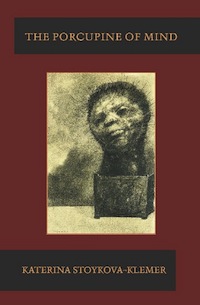Book Review
Katerina Stoykova-Klemer, The Porcupine of Mind, Broadstone Books, 2012
by Lucia Cherciu
The Porcupine of Mind by Katerina Stoykova-Klemer is a book of poetry you will pass to your friends and earmark to use in your poetry writing classes, and it will soon disappear from your shelf because someone will lift it. It reads fast, makes you laugh, shocks your senses and expectations, and cuts like laser through languages. This could be what translators dream of: a book of poetry that translates well because the words are so sharp, ironic, and twisted that they burn holes through language walls.
Stoykova-Klemer’s poem about a potato is the one I reach for when some of my students confess they are baffled by metaphors. Here’s the lead poem from her bilingual volume The Air around the Butterfly (Fakel Express, 2009): “Often I Wish I Were // a potato. // Eyes opened / in all directions. // Unafraid / of the cold earth. // The difference / between life and death / for somebody” (6).
In her new book, The Porcupine of Mind, Katerina Stoykova-Klemer’s logic of metaphor reads like a game, a riddle, and a lesson in empathy all at the same time. The section titled “The Downside of Lucidity” includes poems based on conceit. For instance, here’s the poem “Guilt”: “wide-eyed beauty, I like holding your hand. // This cigarette sends / mixed signals from the ashtray. // Next to it: your drink, over; your food, untouched. // Your nails are painted scarlet, // your mouth—painted shut” (67). Parallelism forges a tight, economical syntax with a satisfying sense of fragmentation and repetition. The unexpected associations and the quick wit often remindof Marcel Duchamp’s canvases or of Salvador Dali’s surrealist turns. “Unforgiveness” is worthy of an anthology of terse metaphors: “splinter in your breastbone, lives / there lodged like a small tree. // Withers in winter, looms / in spring. Its fruit is sweet / on first bite, then turns / into the taste of your own flesh” (68). Spare in their stunning economy, Stoykova-Klemer’s poems thrive on understatement, as if she watches the world through a magnifying glass and helps readers see it through a lens often miraculous, full of candor and ludic disposition.
Stoykova-Klemer’s poems have qualities of haiku, so meditation, philosophy, and syllogism come together. Nature provides the ingredients for a minimalist view, and the poet becomes a sieve, perceiving the world and rendering it through myriad details, use of all senses,and kind perception of a small world of butterflies, grapes, and flies. The syllogistic structure of her poems recaptures the wonder and laughter of all things small. Often based on a joke or sudden association of unexpected and shocking metaphor, her poems facilitate the jump of syllogism, rife with innuendoes and allusions. Impish and playful, the poet delights in synecdoche and chiasms, internal rhyme and word play.
As someone who has learned English as a Second Language, Stoykova-Klemer draws on her Bulgarian inflections and builds a bridge between languages. Indeed, her jocular fascination with words can be seen in her poem “Creative Spurt,” which details the inner conflicts of bilingualism: “By now the moon has shrunk back / to a dark comma in the sky, / and I have stopped writing. // Two weeks of rubbing pen and paper / like a cicada its front legs, and erupting/ in some language I no longer use // for thinking. They say the tongue / you become a poet in is the one / which can never tell a lie” (52). Quotable because of its aphoristic nature, Stoykova- Klemer’s poetry sometimes feels as if it translates the savor and the absurd zest of droll Bulgarian proverbs. Here’s her poem “The Pull of One’s Origin” in all of its two lines: “The hanged man climbs back / along his own rope” (57).
Stoykova- Klemer’s poems inspire optimism and compassion. Notice the kind tone in the poem “Extravagance”: “The old man sinks / back into the hammock / of his body. Do I / really need all this?” (74). The poet does not take herself too seriously, so she accomplishes more. What she leaves out supplants what is included. She is a master of the skillful, terse title that hides the key to the riddle, sets up the exposition, and provides the first line of the poem all at the same time.
Stoykova- Klemer’s technique, innovation, and playfulness help to highlight the main concept of the book. The first section follows an arc based on the repetition of the theme of kissing: kissing a grape, a tide, or a stone suggests stopping to understand the miraculous in everyday things, the wonder in front of the many mysteries right in front of our eyes. Overall, her book bespeaks her experience moving between languages and world views.
Dr. Lucia Cherciu is a Professor of English at SUNY / Dutchess in Poughkeepsie, NY, and she received her Ph.D. in Literature and Criticism from Indiana University of Pennsylvania in 2000. Her poetry appeared in Paterson Literary Review, Connecticut Review, Cortland Review, Memoir (and), Legacies, Spillway, Interdisciplinary Studies in Literature and the Environment, Off the Coast, and many other literary magazines, both in English and in Romanian. Her book of poetry “Lepădarea de Limbă” (“The Abandonment of Language”) was published in 2009 by Editura Vinea in Bucharest. Her second book, “Altoiul Râsului” (“Grafted Laughter”) was published by Editura Brumar in 2010.


